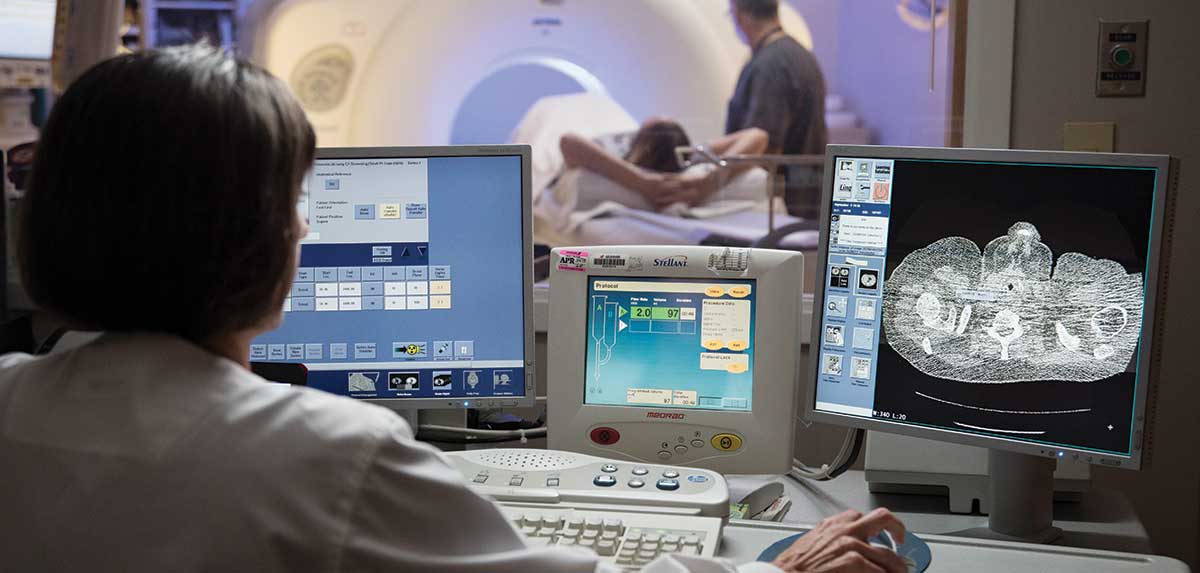Screenings
Prevention & Early Detection
The number of people diagnosed with cancer is expected to grow 36 percent by 2030. Cancers of the breast, prostate, colorectal, melanoma and lungs will continue to be the most commonly diagnosed diseases.
Sentara is dedicated to finding new ways to detect cancer at its earliest stages, when the disease is most treatable. We know that prevention and early detection are paramount to ensuring that everyone who is affected by cancer has a chance to enjoy a long, full life.
Breast Cancer Screenings
Our 10 comprehensive breast centers employ full-time radiologists who have fellowship training in breast imaging. Tomosynthesis technology, or 3D mammography, allows our radiologists to spot cancer more easily and earlier than before, especially in dense breast tissue where cancer tumors are harder to detect. Our online scheduling system and mobile mammography unit make screenings more accessible to women.
Colorectal Cancer Screenings
Sentara took part in the national “80% by 2018” initiative launched by the National Colorectal Cancer Roundtable. Our shared goal is to get 80 percent of adults aged 50 years and older regularly screened for colorectal cancer by 2018.
In 2017, Sentara initiated a best practices alert with Sentara Medical Group. The electronic medical record alert reminds primary care physicians to address colorectal screening during a patient’s visit. We’re also stocking offices with take-home, mail-in fecal immunochemical tests (FIT) to give to patients who choose not to undergo a colonoscopy. These tests screen for hidden blood in stool, an early indicator of cancer. A colonoscopy is still the recommended screening, but FIT is used for patients if needed. A patient will still need a colonoscopy after a FIT test if any abnormal findings are discovered. In late 2016, we began testing a text message alert system that notifies patients when it’s time for a screening or when a screening is overdue.
Also in 2017, Sentara began offering FIT to uninsured and under-insured patients at the Sentara Ambulatory Care Center in Norfolk. This population is among the least likely to get colorectal screenings. Our on-site patient navigator ensures patients complete FIT and schedules free colonoscopies when needed.
Lung Cancer and Low-Dose Computed Tomography Scans
LDCT gives a more detailed look at the lungs than chest X-rays, making it one of the best tools available for detecting lung cancer at its earliest stage. In 2017, Sentara Halifax Regional Hospital and Sentara Northern Virginia Medical Center began offering this service, expanding the program to all Sentara Cancer Network hospitals. LDCT is offered at 23 Sentara hospital and ambulatory clinic locations. Out of the nearly 3,000 screenings we completed in 2017, 37 people were diagnosed with lung cancer. More than half of those patients had stage 1 lung cancer. From 2017 to 2019, 182 lung cancers and 15 other cancers were identified through LDCTs. Over half of the lung cancers found were Stage 1 as compared to only 25% of all lung cancers in the National Cancer Data Base were found at Stage 1.
Head, Neck and Thyroid Cancer Screenings
Endocrinologists and head and neck surgeons from Sentara EVMS Comprehensive Head and Neck Center in Norfolk participate in free head, neck and thyroid cancer screenings every April during national Head and Neck Cancer Awareness Month. Patients identified as having a potential thyroid problem undergo ultrasound tests that same day. Counselors are available to meet with patients who need to see a specialist for a follow-up appointment. Smoking cessation resources are provided to current smokers. A team of community educators, navigators, and counselors are available for patients requiring follow-up.
Gynecologic Cancers and Screenings
With no reliable screening test (and few early warning signs) for ovarian, uterine, vaginal and vulvar cancers, physician and patient education and awareness remain at the forefront of the Sentara Cancer Network efforts for the early detection of gynecologic cancers. We continue to promote routine Pap tests to detect changes in cervical cells that can indicate cervical cancer. Our gynecologic cancer experts meet regularly with providers to provide education about cancer symptoms. In 2017, we created new materials designed to teach women about cancer warning signs.
